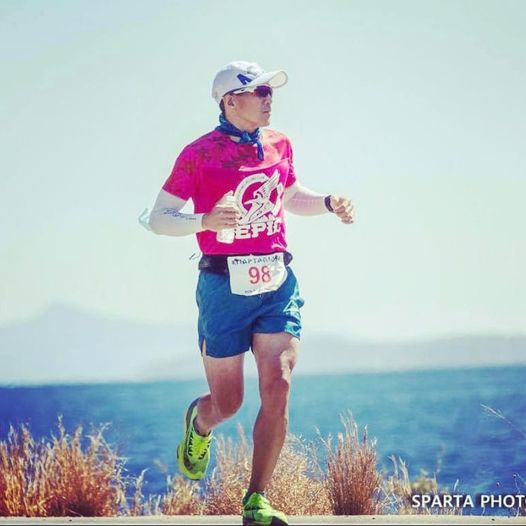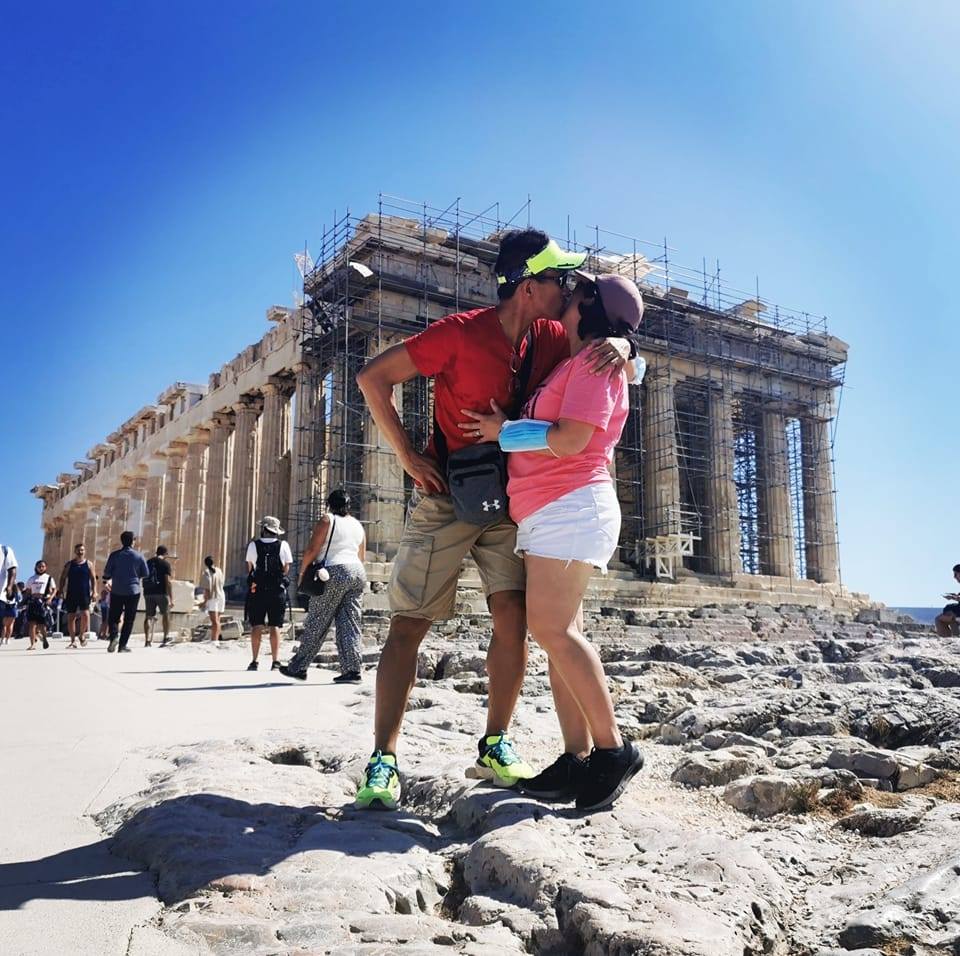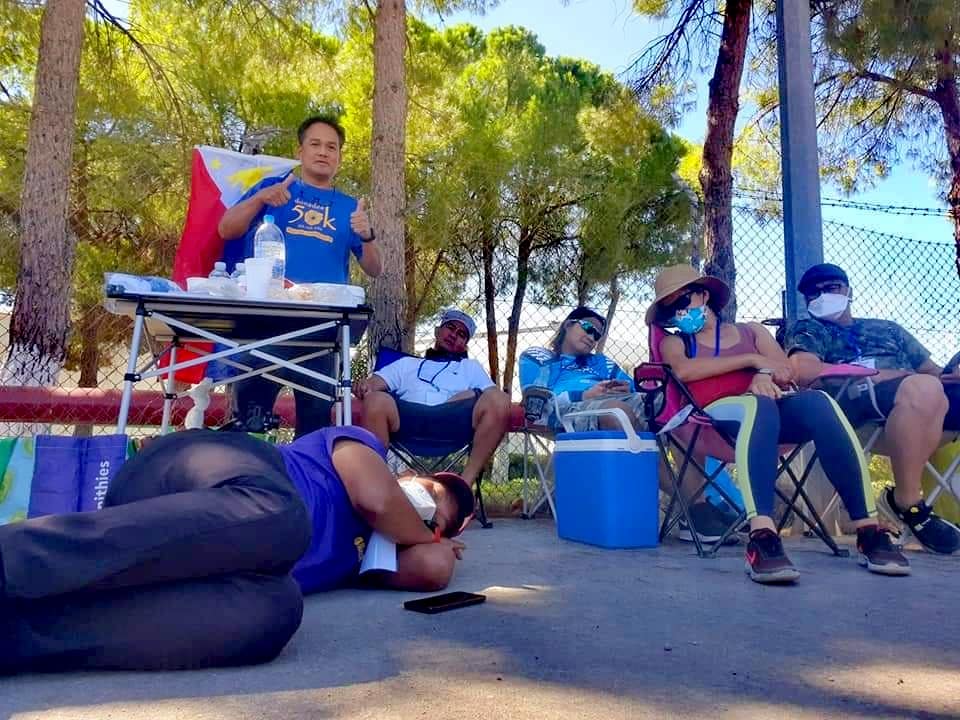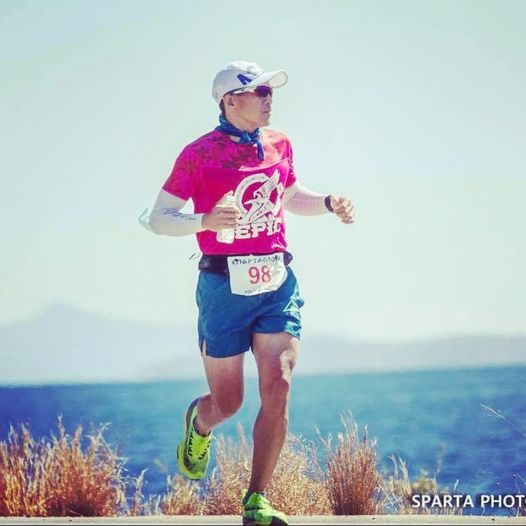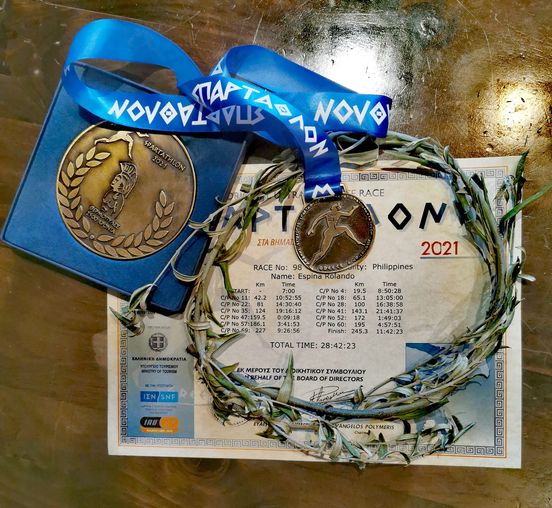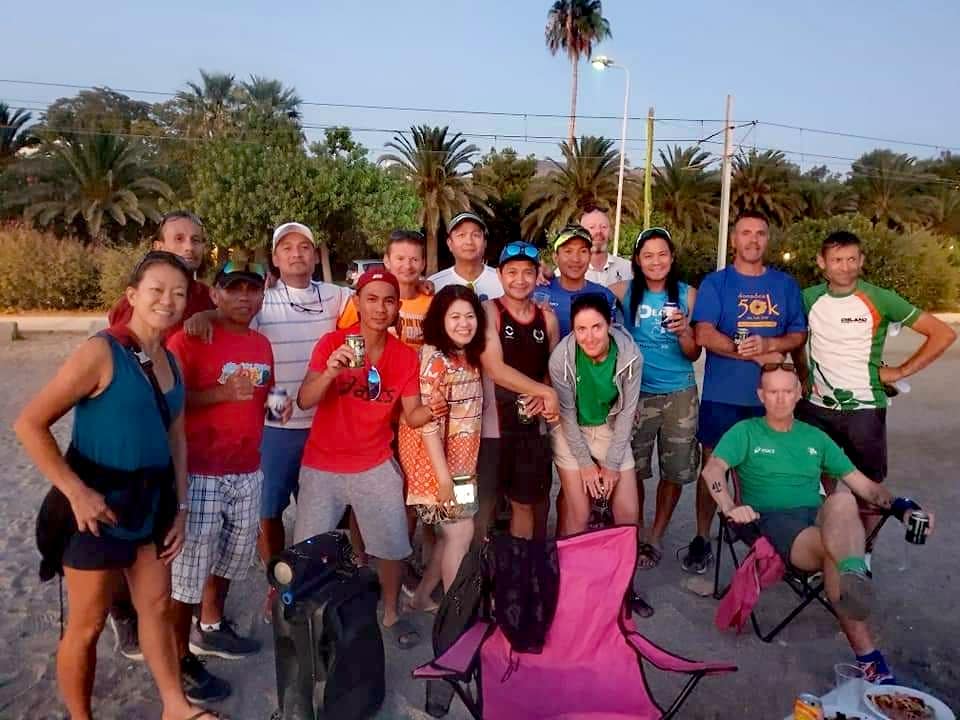1. Personal Data We Collect
1.1 Personal Data You Provide Us
When you sign up to use our Services, you voluntarily provide Personal Data.
This Personal Data may include, but is not limited to, your contact information
such as a first and last name, email address, postal address, and phone
number; an account password; your date of birth; your gender; your social
media account(s) information; your subscription preferences; your
photographs, videos, or other content you or we contribute from your
participation in events; your payment and billing information; your participation
in or donation to a particular charity or charity event; your geo-location; your
emergency contact information; your athletic performance in or your training
performance for events; and/or information you include in public forums,
messages, comments, searches, or queries through the Services.
From time to time, we run sweepstakes or contests through our Services or
ask you to complete questionnaires or surveys. We use the information that
you provide to administer the sweepstakes, contests, or surveys, to analyze
results, to conduct research, to comply with legal requirements, to share
information or offers we think may be of value or interest to you, and for other
purposes as described in this Policy.
1.2 Personal Data We Collect Automatically
As you use our Services, some of your Personal Data are collected
automatically. This Personal Data may include, but is not limited to, your
internet protocol (“IP”) addresses; your device and browser type; your internet
service provider (“ISP”); your operating systems; statistics on your activities
through the Services, such as your login frequency or the length of time spent
logged in; information about how you came to our Services; advertising
metrics and links clicked within the Services; and/or information collected
through cookies, web beacons, and other technologies as described below
under “7. Cookies, Web Beacons, and Other Technologies”.
1.3 Personal Data We Collect From Third Parties
We may also collect Personal Data about you from third-party sources such
as, though not limited to, event organizers, event timers, and other
commercially and publicly available sources. For example, if you click through
our Services to register for an event, the event organizer may provide us with
your name, contact information, age, gender, and race time. The information
we receive from third parties may be combined with the information we collect,
including personally identifiable information that we collect about you.
You may also be able to choose to link your account with certain third party
applications, such as Facebook or Google. When you link your account to one
of these third party applications, we will request permission to access your
basic information such as your name, profile picture, gender, networks, user
ID, list of friends, and any other information you’ve made public on that
application. For more information regarding linking your account with third
party applications, please see “3.7 Third Party Applications” below.
1.4 Personal Data From Your Mobile Device
We may provide features that rely on the use of additional information on your
mobile device or require access to certain services through your mobile
device that will enhance your experience but are not required to use the
Services. Granting us access to this information does not mean you are
granting us unlimited access to that information or that we will access specific
information without your permission. Some Personal Data from your mobile
device, such as your mobile device ID, your operation system, your mobile
carrier, and your IP address, are collected automatically when you use our
Services. When using our Services through your mobile device, we will
request permission to obtain your current location to provide you with location-
related services. In the “Settings” function on your phone, you will have the ability to manually permit or preclude us from recording your geolocation
information for certain features of the Services.
2. How We Use the Personal Data We Collect
2.1 Your Account
We may use the Personal Data that we receive or collect about you for
purposes such as to register your account for certain Services we provide, to
communicate with you regarding our products or, to register you for events
and provide event start lists and results, to help facilitate your participation in
fund raising activities or charity events, to improve our Services by providing
personalized experiences, location customization, personalized help and
instructions, and for such other customer service purposes. We may obtain
additional Personal Data about you to keep our records current.
Third parties should note that we may use information we receive or collect
regarding users (including without limitation via an event registration page) in
accordance with the terms of this Policy. In certain contexts, we collect
information on behalf of third parties that is subject to contractual
requirements that limit our ability to use and transfer your information in ways
that are narrower than those in this Policy. In those limited circumstances,
your information is subject to those contractual requirements and not to this
Policy, and is subject to enforcement by the applicable third party. If your
information is collected on behalf of a third party, it will be evident at the time
that you provide such information. This Policy does not cover a third party’s
use of your information outside of our Services. You will need to contact that
party directly to determine if your information is subject to such limitations on
uses and to determine how the third party will make use of your information.
2.2 Our Business Use
We may use the Personal Data that we receive or collect about you for
internal business purposes such as helping us improve the content and
functionality of our Services, to better understand our users and how they use
our Services, to improve the Services we offer, to develop new features or
services, to manage your account, to provide you with customer service, to
help improve our security and prevent fraud, to comply with all legal
obligations and rights, and to generally manage the Services and our
business.
2.3 Communications and Marketing
We may use the Personal Data that we receive or collect about you for
communications purposes such as to provide you with information you have
requested to receive from us in response to your opt-in requests, to send you
electronic communications regarding events, news and updates, newsletters,
and promotions, to send you promotional or marketing materials via electronic
communications, to provide you with offers for third party products and
services, and to inform you of new changes or updates to our Services. We
may also use your Personal Data for marketing and advertising purposes such as advertising our Services on third party websites and in displaying
targeted content and advertisements to you on or off our Services. For further
information regarding electronic communications, please see “5.3 Opting Out
of Electronic Communications” below.
3. How We Disclose and Transfer Your Personal Data
3.1 Not Selling Your Personal Data
We consider your trust in us regarding your Personal Data to be an important
part of our relationship with you. Therefore, we will not sell your Personal Data
to third parties, including third party advertisers. There are some
circumstances, however, where we may disclose, transfer, or share your
Personal Data with a third party without notice to you, as described below.
3.2 Business Transfers
There may come a time when we sell or buy businesses or assets. In the
event of a corporate sale, merger, reorganization, dissolution, or similar event,
Personal Data may be considered part of the transferred assets. By using our
Services, you acknowledge and agree that any successor to RaceYaya (or its
assets) will continue to have the right to use your Personal Data in
accordance with this Privacy Policy.
3.3 Parent Companies, Subsidiaries, and Affiliates
We may disclose, transfer, or share your Personal Data with our parent
companies, subsidiaries, and/or affiliates for purposes according to this
Privacy Policy. Any Personal Data disclosed, transferred, or shared with our
parent companies, subsidiaries, and/or affiliates will be done so in a manner
consistent with this Privacy Policy.
3.4 Contractors, Consultants, and Service Providers
We may disclose, transfer, or share your Personal Data with our contractors,
consultants, and/or service providers who process Personal Data and/or
perform certain business-related functions on behalf of RaceYaya. These
companies may include, but are not limited to, marketing agencies, personal
information processors, database service providers, backup and disaster
recovery service providers, email service providers, and others. When we
engage another company to perform such business-related functions that may
require access to Personal Data, these companies will agree to maintain the
confidentiality, security, and integrity of such Personal Data in accordance
with this Privacy Policy. The access that these companies receive will be
limited to such Personal Data needed to successfully complete the business-
related function they have been engaged for.
3.5 Event Organizers
When you register for an event through an event page or through a page on
our Services, we will provide the Personal Data entered on the applicable
page to the event organizer. If an event has a charity fundraising component
to it, your Personal Data may be provided to that charity as well. An event
organizer may appoint a third party, which may or may not be affiliated with
the event organizer, to create an event page on its behalf, in which case, that
third party may also have access to your Personal Data. By using our
Services to register for an event, you agree that RaceYaya is not responsible
for the actions of these event organizers or the third parties that they use with
regards to your Personal Data. It is important that you review the applicable
privacy policies of the event organizers, and if applicable, that of their
appointed third parties, before providing Personal Data or other information in
connection with an event.
3.6 Marketing Partners
We may disclose, transfer, or share your Personal Data to third parties with
whom we have marketing, promotional, or other advertising relationships.
These third parties may use your information to market products and services
We may combine the Personal Data that we collect about you with other
information that we obtain from third parties. This information may be used to
help us determine what advertisements to direct to you, to place on our
websites, or where to advertise our Services. You have the ability to opt-out of
certain uses of your information, as well as the ability to opt-in to receiving
certain information from us and these third parties as discussed below in “5.3
Opting Out of Electronic Communications”. These third parties may also use
cookies, JavaScript, web beacons, and other technologies to measure the
effectiveness of their ads and to personalize advertising content. For further
information about the use of third party technologies, please see “7. Cookies,
Web Beacons, Etc.”.
We may share aggregate or anonymized information about users with third
parties for marketing, advertising, research, or similar purposes. For example,
if we display advertisements on behalf of a third party, we may share
aggregate, demographic information with that third party about the users to
whom we displayed the advertisements.
At times, our Services may contain links to other third party websites and
services. Any access to and use of such linked websites is not governed by
this Privacy Policy, but is governed by the privacy policies of those third party
websites and services. We are not responsible for the information practices
and policies of such third party websites and services.
3.7 Third Party Applications
Some of our Services allow you to connect your RaceYaya account to third
party services, like Facebook or Google Mail for example, through Single Sign
On authorization (“SSO”). If you choose to connect your account with a third
party application, that third party application may have access to certain
Personal Data including, but not limited to, your name, username, email
address, location, and age. Connecting your account may also allow a third
party application to collect your IP address, which page(s) you are visiting on
our Services, and may set a cookie for its feature(s) to function properly.
Additionally, that third party application may share some of your Personal
Data on its service with RaceYaya, and your interactions with it on our
Services may be shared with others within your social network. Depending on
the application, your ability to adjust your account settings and the sharing of
your Personal Data may reside in our Services or within the third party
application. Please be aware that your ability to use SSO with third party
applications may be impacted and/or prevented by any limitations you set with
your Personal Data.
A third party application’s use of information collected from you (or as
authorized by you) is governed by the third party application’s Privacy Policy
and your settings on its service, and that RaceYaya’ use of such information is
governed by this Privacy Policy and your RaceYaya account settings.
RaceYaya is not responsible for the collection and use of your information by
third party applications.
3.8 Legal Requirements
We may disclose, transfer, or share your Personal Data if required to do so by
law or in order to respond to a subpoena or request from law enforcement
agencies or courts, or to good faith belief that such action is necessary to (i)
comply with a legal obligation, (ii) protect or defend our rights, interests, or
property, or that of third parties, (iii) prevent or investigate possible
wrongdoing in connection with our Services, (iv) act in urgent circumstances
to protect the personal safety of users of our Services or the public, or (v)
protect against legal liability.
4. How We Secure Your Personal Data
We take your security seriously and strive to take reasonable steps to protect
your information. No data transmission over the internet or information storage
technology can be guaranteed to be 100% secure. Although we continue to
evaluate and implement enhancements in security technology and practices,
we can only implement measures and take steps to help reduce the risks of
unauthorized access. You are also advised to take steps to protect your
information and further minimize the likelihood that a security incident may
occur.
The following is a summary of the measures we take to protect the Personal
Data you provide us and an explanation on how we implement these
measures:
4.1 Secure Socket Layer
We use Secure Socket Layer (“SSL”) encryption when transmitting certain
kinds of information, such as payment information or Personal Data. An icon
resembling a padlock is displayed in most browsers’ window or address bar
during SSL transactions. For example, any time we ask for a credit card
number for payment or for verification purposes, it will be SSL encrypted in its
transmission to our third party payment gateway, Authorize.net, Dragonpay or
Paypal. The information you provide will be stored securely on Authorize.net, Dragonpay or Paypal services. Once you choose to store or enter your credit
card number in our Services, it will not be displayed back in its entirety.
Instead of the entire number combination, you will only see asterisks and
either the first four digits or the last four digits of your credit card number.
4.2 Secure Storage
We maintain reasonable physical, electronic, and procedural safeguards that
comply with Philippine laws and regulations, and with International Privacy
Policies to protect personal information about you.
4.3 Vendors and Partners
We work with vendors and partners to protect the security and privacy of user
information. Our Services are hosted on a secure server which has its own
procedures and controls to ensure data security.
4.4 Personnel and Contractor Access to Personal Data
We limit access to personal information to trained personnel who will or might
come into contact with said information in the course of providing our products
and services.
5. Choices You Have Regarding Your Personal Data
5.1 Accessing, Updating, Correcting, or Deleting Your Personal Data
Upon request, we will provide you with information about whether we maintain
or process on behalf of a third party, any of your Personal Data. If your
personal information changes, the Personal Data we collected about you is
inaccurate, or if you wish to no longer use our services, you may also request
that your Personal Data be corrected, amended, or deleted. Requests for
access to your Personal Data and to have it corrected, amended, or deleted
should be sent to [email protected] or to the mailing address provided
under “Contact Us”. We will try to meet all requests regarding Personal Data,
however, you may not be able to remove your personal information from
archived web pages we no longer maintain, such as your name and race time
from past events you’ve competed in. If we are unable to complete your
access request, we will let you know we are unable to do so and why. We
may decline to process requests that are unreasonably repetitive, require
disproportionate technical effort, jeopardize the privacy of others, are
extremely impractical, or for which access is not otherwise required by local
law.
If your information has been shared with a third party, as described above,
then that third party has received their own copy of your data. If you have
been contacted by one of these third parties and you wish to correct or
request deletion of your information, please contact them directly.
5.2 Limiting the Personal Data You Provide
You can browse our Services without providing any Personal Data (other than
data automatically collected to the extent it is considered Personal Data under
applicable laws) or by limiting the Personal Data you provide. If you choose
not to provide any Personal Data or limit the Personal Data you provide, you
may not be able to use certain functionality of the Services.
5.3 Opting Out of Electronic Communications
RaceYaya may send you electronic communications marketing or advertising
our Services or events. When you sign up and use our Services, you will be
given the option to sign up for “RaceYaya News and Updates” and “Partner
Offers” from us or other third parties. If at any time you would like to stop
receiving the information that you have requested to receive from us, you may
follow the opt-out instructions contained in any such electronic
communication. Additionally, you may also manage your email preferences at
any time through your account.
If you opt-out of receiving emails or promotions from us, we may still send you
emails about your account or any Services you have requested or received
from us, or for other customer services purposes. In addition, you may still
receive emails sent by third parties through means other than our Services. If
you opt-out of receiving information related to a particular event, you may still
receive RaceYaya communications or communications from other organizers
whose events you have attended, are registered to attend, or who have
otherwise obtained your email address. You may have to unsubscribe from
multiple emails before you stop receiving all communications related to events
for which you registered through our Services.
Please be aware that you cannot unsubscribe from update communications
about our Services unless you deactivate your account. If you wish to close
your account, please email [email protected]. Even after you opt-out of all
communications, we will retain your Personal Data in accordance with this
Privacy Policy, as provided under “6. Retention of Your Personal Data”,
though we will no longer use it to contact you. However, third parties who
have received your Personal Data in accordance with this Privacy Policy may
still use that Personal Data to contact you in accordance with their own
privacy policies. You will need to contact those third parties in order to have
your information deleted from their records as well. If you wish to not have
your Personal Data shared with third parties for the creation and display of
targeted advertisements, you will need to close your account. You can do so
by emailing us at [email protected].
5.4 Social Media Notifications
If you connect a third party application through SSO or sign up for other social
media integrations, you may receive social notifications from these additional
services or from RaceYaya’s Services. You can manage these social
notifications by toggling your social settings to private or disconnecting such
integration. For more information regarding connection of third party
applications, see “3.7 Third Party Applications”.
6. Retention of Your Personal Data
We may retain your Personal Data as long as you are registered to use our
Services. You may close your account by contacting us by email
at [email protected] or by mail at the address listed under “13. Contact
Us”. However, please be aware that we may retain Personal Data for an
additional period as required under applicable laws. After we delete your
Personal Data, it may exist on backup or archival media or servers for an
additional period of time for legal, tax, or regulatory reasons, or for legitimate
and lawful business purposes.
7. Cookies, Web Beacons, Etc.
7.1 What Cookies and Web Beacons Are
Cookies are small data files placed onto your computer or mobile device when
you visit a website which allows our Services to distinguish you from other
users, allow the Services to work properly, as well as to help monitor
advertising effectiveness.
Web beacons work similar to cookies, however, instead of a file stored on
your computer, web beacons are embedded invisibly on web pages.
We use cookies, web beacons, tags, and other similar tracking technologies
to track when you visit our websites and mobile applications (collectively,
“Cookies”). We also allow third parties to place Cookies on our Services to
assist with advertising.
7.2 How We Use Cookies
There are several reasons we use Cookies on our Services. Some of these
Cookies are necessary for technical reasons and help our Services to operate
as intended for your benefit (“Essential Cookies”), such as access to secure
areas of the Services. Other types of Cookies are used for analytical purposes
such as how our Services are being used, the effectiveness of advertising
shown as you use the Services, and to customize advertising to you
(“Analytical Cookies”). While these types of Cookie help us create new
features, improve on our existing Services, and provide advertisements of
interest to you, our Services can function without them.
7.3 Controlling Cookies
You have the right to decide whether to accept or reject Cookies. You can
exercise your Cookie preferences by activating the setting on your web
browser that allows you to refuse the setting of all or some Cookies. However,
if you use your browser settings to block all cookies (including Essential
Cookies), you may not be able to access or use all or parts of our Services. If
you have not adjusted your browser setting so that it will refuse cookies, our
system will issue Cookies as soon as you visit our Services. Blocking or
deleting Cookies will not prevent device identification and related data
collection from occurring when you access our Services. Turning off Analytical
Cookies will prevent their ability to measure the relevance and effectiveness
of our Services, emails, and advertising as well as to show you tailored
advertising, however this does not mean you will no longer see any
advertisements when you use our Services.
8. Children
Users under the age of eighteen should use the website with adult
supervision, including registration for an event. If you are aware of a user
under the age of eighteen (18) who has provided Personal Data through our
Services, please contact us at [email protected]. Parents and legal
guardians may choose to provide information about their children, even if
under the age of eighteen (18), for the purposes of event registration on our
Services. Please be aware that the results of all events, including name, age,
gender, and results time, are made publicly available and published online
after an event’s completion.
10. Terms of Use
Your use of our Services, as well as any dispute over privacy, is subject to this
Privacy Policy and our Terms of Service, available at ADD LINK TO OAGE
HEREA and incorporated by reference here.
11. Exclusions
11.1 Personal Data Provided to Others
This Privacy Policy does not apply to any Personal Data that you provide to
another user or visitor through the Services or through any other means,
including those provided to organizers on event pages or information posted
by you to any public areas of the services.
11.2 Third Party Links
This Privacy Policy applies only to the Services we offer. The Services may
contain links to other websites not operated or controlled by us (the “Third
Party Sites”). The policies and procedures we described here do not apply to
the Third Party Sites. The links from the Services do not imply that we
endorse or have reviewed the Third Party Sites. We suggest contacting those
sites directly for information on their privacy policies.
11.3 Aggregated Personal Data
In an ongoing effort to better understand and serve the users of our Services,
we often conduct research on our customer demographics, interests, and
behavior based on Personal Data and other information that we have
collected. This research may be compiled and analyzed on an aggregate
basis. Please note that this aggregate information does not identify you
personally and we therefore consider and treat this data as Non-Personal Data.
12. Changes to This Privacy Policy
RaceYaya reserves the right to update or modify this Privacy Policy at any
time. If we make changes to this Privacy Policy, we will post the revised
Privacy Policy to our website with a changed “Last Updated” date at the top of
this Privacy Policy. All changes are effective 30 days after posting. Your
continued use of Services following the effectiveness of any changes
constitutes acceptance of those changes. If you do not agree with any of the
changes to the Privacy Policy, you should cease accessing, browsing, or
otherwise using of the Services we provide, and close your account by
emailing us at [email protected].
13. Contact Us
We regularly review our practices regarding Personal Data and this Privacy
Policy. If you have questions, comments, or concerns about this Privacy
Policy, please contact us at:
- By email [email protected]
- By mail at:
- ATTN:
- Runfitness Marketing, Inc.
- 67 Valenzuela St., San Juan City
